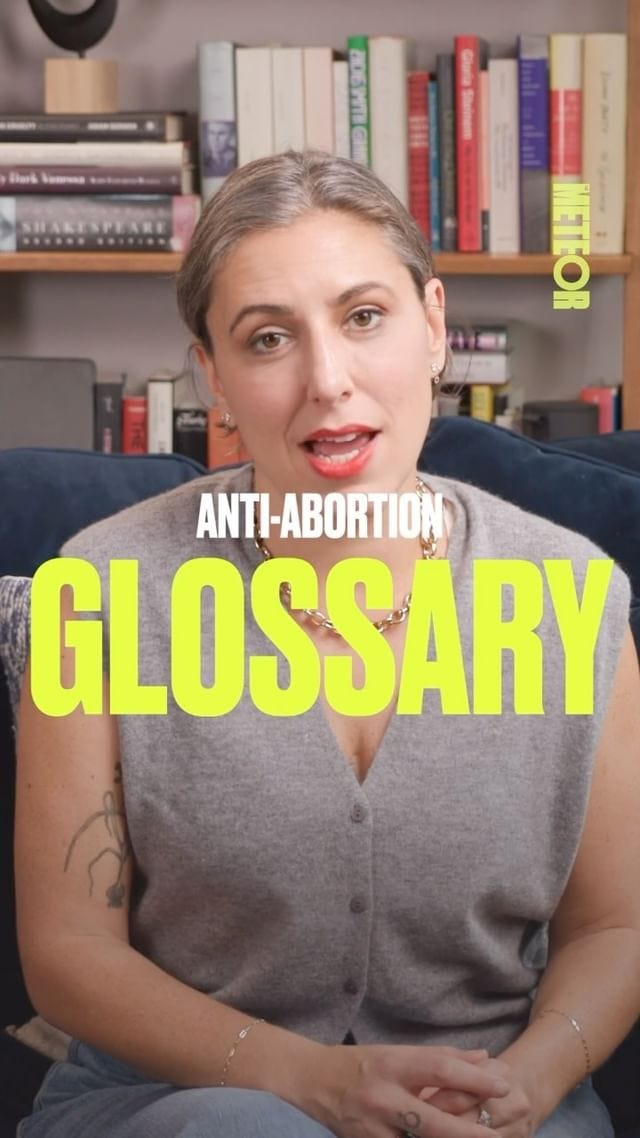Ever since the constitutional federal right to abortion was eliminated in the United States, there have been thousands of people across the country fighting to make abortions safe, affordable, and accessible for anyone who wants one.
is one of those people. She’s been writing her daily newsletter, , for over two years, and her ability to sort through the ever-changing news cycle, policy changes, and legislative wins and losses in order to provide readers with clarity, hope, and action plans - is nothing short of heroic.Jessica has a new book out, Abortion: Our Bodies, Their Lies, And The Truths We Use To Win, and I’m so honored to share our conversation about healthcare, reproductive justice, and how political strategy has shaped our current moment.
Sara
For folks who aren't familiar with your work, could you talk about what led you to start your daily abortion newsletter and ultimately write your book?
Jessica
I mean, I think what's interesting is that it really wasn't a conscious decision. It really came about because I was so angry about everything that was happening and felt incredibly overwhelmed by all of the horror stories that were coming out, the onslaught of legal attacks. It just all felt like so much.
And so I honestly just sort of started almost as a project for myself to make sure that I felt on top of everything. And then, you know, within a week or so, I was like, Oh, this is a real thing. This is a thing that's going to need to be done, and I'm doing it. And I just kept going.
For me, the hope has always been to provide as much order as possible amidst all the chaos. And to give folks, both with the newsletter and the book, the information, context, and language they need to do what they have to do to push back.
And I mean, the newsletter is sort of ephemeral. It's here one day, gone the next. You delete it from your inbox. So with the book, I wanted to capture this particular moment in time. I think we're going to look back at this moment, and really need to process how it all happened.
And of course, I wanted to get it out before the election as well.
Sara
A friend and I recently held a fundraiser for a local clinic which (among other things) provides access to abortion care, gender affirming healthcare, and all sorts of healthcare for people with uteruses, and we learned how the intricacies of state politics DIRECTLY impact access to care. *** There’s something called an executive council in New Hampshire and they vote to give (or withhold) funding on any state or federal contracts over $10,000.00. NH’s executive council is made up of 4 anti-abortionists and they’ve voted against funding family planning in NH’s abortion clinics five times since 2021 despite the fact that a state audit verified that these clinics do not use the family planning funding for abortion care. How often does something like this come up in your reporting? Either incredibly important legislation the general public is unlikely to be familiar with, or incredibly important political offices the general public is unlikely to be familiar with?
***If you want to read more about how critically important state politics are, and join the In Pursuit Giving Circle, you can do so here!
Jessica
I mean, multiple times a week. It happens a lot. And I consider myself a person who knows a lot about this issue. And I find stuff every day that ends up surprising me.
So much of what the right does in terms of attacks is built into our government systems, right? Like, they have had 50 years to do this, to plan for this. And so there's so much little–it’s actually not little—but it can feel little–like, bureaucratic red tape. And it’s everywhere. Just everywhere.
And honestly, that's part of the reason I wanted to write the book, because understandably we are so focused on the horror stories and the urgent need for care, that sometimes we miss these foundational structures that are making all of those nightmares possible in the first place.
Sara
It sometimes seems like this stuff is confusing and opaque BY DESIGN.
Jessica
By design is the exact right way to say it. They want it to be as confusing as possible. They want to make sure that we have no idea what's happening or that we'll be too overwhelmed to keep up.
Sara
It’s depressing because that seems like an effective strategy! What are some of the most problematic misconceptions about reproductive justice that you've discovered in your work?
Jessica
There's so much. I think the anti-abortion movement has been successful in a lot of their disinformation campaigns, particularly around, like, abortions and safety. And the commonality of abortions.
They've done a really good job at making abortion seem like something separate from healthcare. By pretending that this is some separate scary thing. And in part that's also because Democrats have been afraid to talk about it up until recently. And still, even now, they're not totally on board.
I think there was a sort of allowance on the part of Democrats to let Republicans go all out spreading this complete and utter bullshit about abortion and just stigmatizing it to all hell. This stigma that they’ve manufactured is one of the things that I worry about the most.
One misconception I focus a lot on in the book is the idea that the country is split on abortion rights. The idea that abortion access is some sort of polarizing issue that voters just can't agree on, when the truth is that voters made their decision a long time ago. Voters overwhelmingly want abortion to be legal, and they have wanted it literally for decades. And now since Roe was overturned, that support has just skyrocketed.
Sara
The right has done such a good job of painting abortion as this “family values” issue. It’s frustrating because the left should be making it an actual family values issue because it is! They should be taking the moral high ground back from the right.
Jessica
It's incredibly frustrating. It's right there for the taking! You can't let the party that's forcing children to give birth call themselves the party of family values. That's obscene.
There is such an opportunity here to correctly and truthfully talk about abortion as a family values issue. Abortion is how people build their families, plan their families. Abortion is healthcare. Abortion keeps mothers safe. It’s all connected.
And I do think that voters are seeing the connections in a way that they hadn't before. So that makes me feel really good. But Democrats are not doing a good enough job of hammering that point home for voters.
Sara
Do you think that'll change?
Jessica
Yes, I do. I think it'll be slow going, but I feel like I can see the language around abortion with Democrats changing already.
I wrote about this a little bit, but look at the way Kamala Harris talked about the death of Amber Nicole Thurman and normalized abortion as a choice she she made in order to maintain her life's plan. And that that was fine. It wasn’t some sort of tragic decision.
Examples like that are actually incredibly meaningful. And so I think we're gonna see sort of a slow roll in that direction.
Sara
In a You’re Wrong About episode on the “pro-life” movement, Megan Burbank provided historical context on abortion in the US, and how it was deliberately weaponized by the right as a moral rallying cry in order to curry votes and gain political power. I think many people (including me!) just assumed the right was always vehemently anti-abortion, but that’s not the case. I just think that the more people understand those very deliberate political tactics, the less power these supposedly moral arguments have.
Jessica
Right. It’s all by design. All of it was strategically planned. They knew exactly what they were doing.
Sara
Can you share any little anecdote that has really excited you or made you feel hopeful about the future of abortion access?
Jessica
I do feel really hopeful, mostly because of the community of people who are doing so much work to take care of each other.
I was in Florida not too long ago, and it was right after the six week ban was passed, and I was doing tours of abortion clinics, and I was in this one clinic. And it was very, very empty. The exam rooms were empty, the waiting room was empty.
But then there was a room all the way in the back where there were like, a dozen young women on the phone. They were booking hotel rooms, buying bus tickets, coordinating travel, and talking to patients.
Rooms like that give me so much hope, because there are rooms like that across the country in every single state and every single community. And I think remembering that and trying to be a part of one of those rooms is extraordinarily helpful when you're feeling downtrodden about it all.
Paid subscribers! If you want to win a copy of Abortion, comment below! A winner will be chosen at random!
I just want to end by echoing Jessica’s assertion that the quickest route to hope is to get involved. At our fundraiser for the Lovering Health Center, which is one of only five abortion clinics in New Hampshire (there are 22 anti-abortion centers!!!), we had the privilege to listen to talks from folks who work at Lovering, a state representative working to increase abortion access, and a rep from Reproductive Equity Now. Not only did I learn SO MUCH, I saw so clearly how much work is being done every single day to help people get the healthcare they need. There’s so much love out there, so much care, and so much truly beautiful collaboration. I’m struggling to find any sort of word that isn’t cliched or sentimental to describe this experience, but I left the evening feeling inspired, energized, and frankly stunned by the community building so many folks are doing every day in this country.
And it’s easy to join this community! Financial support is always needed and welcome, but there are myriad ways to support abortion clinics in your community. Here are some excellent resources from Jessica, and if any of my NH readers want to collaborate with (or donate to!) Lovering specifically, you can do so here.









Donating to abortion networks, especially in states I've traveled to with reprehensible laws, is something I've been doing, but I am also supporting my local abortion fund here in MD because I know we're getting more people seeking care here. (For anyone who needs this information, Baltimore-Washington International (BWI) is a major focus city for Southwest and is about 20 minutes from downtown Baltimore, where there is a Planned Parenthood and other providers to give you the care needed.)
Please vote, everyone!